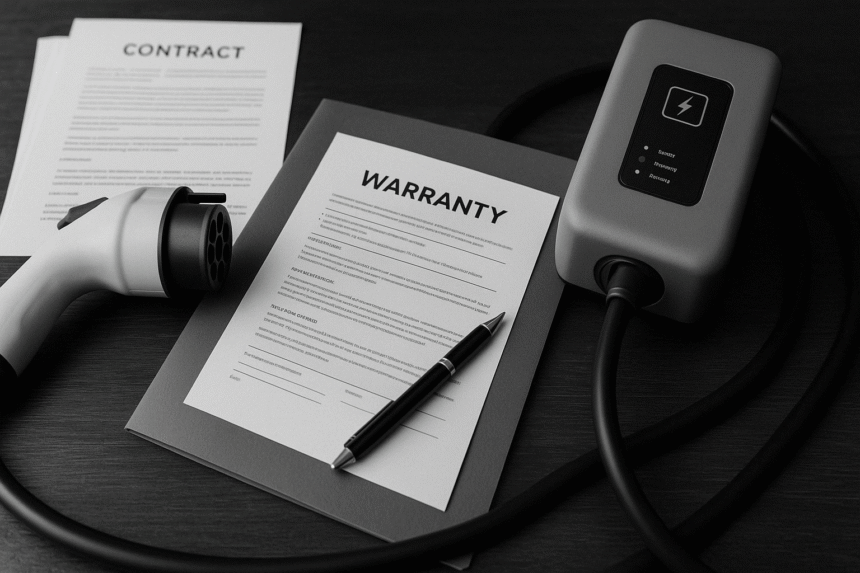How EV Infrastructure Providers Manage EV Charger Warranties with Clarity
As electric vehicle adoption grows, the demand for charging infrastructure is rising—and with it comes the need for robust EV charger warranty management. Many clients assume that once a charger is installed, any future issues will be covered automatically. That’s rarely the case. The reality is that warranty management for EV chargers requires clearly defined roles between manufacturer and installer to avoid disputes, lost revenue, and legal headaches.
This article explores how EV infrastructure providers can excel at EV charger warranty management. Whether you’re a CPO, contractor, or service provider, these best practices will help you protect your business and improve client trust through structured EV charger warranty management processes.
Manufacturer vs. Installer Responsibilities in EV Charger Warranty Management
One of the biggest sources of confusion in warranty management for EV Chargers is understanding the split of responsibilities:
Manufacturer Warranty Typically Covers:
-
Charger hardware and internal components
-
Manufacturing defects
-
Replacement of faulty parts (sometimes shipping is included)
-
Limited service labor if performed by authorized personnel
Installer (or Infrastructure Provider) Typically Covers:
-
Installation quality and workmanship (6–12 months)
-
Site integration (cabling, mounting, grid connection)
-
Commissioning support
-
First-line diagnostics or on-site inspections
Clients often wrongly assume the manufacturer handles everything. Proper warranty management means defining and documenting both parties’ roles clearly.
The Importance of Clear Communication for EV Charger Warranty Management
Clear communication is essential for effective EV charger warranty management. When clients don’t know who to contact or what’s covered, frustration mounts. To avoid misaligned expectations, apply these best practices:
- Provide a warranty summary document at commissioning
- Explain who to contact for hardware versus installation issues
- Clarify coverage durations for both product and service
- Note any fees for site visits beyond warranty
- Use client-friendly language and avoid jargon
Strong communication improves client experience and reinforces professional EV charger warranty management.
Create a Warranty Cover Letter to Support EV Charger Warranty Management
A clear, professional warranty cover letter strengthens EV charger warranty management. It should include:
- Charger Information: model, serial number, manufacturing and commissioning dates
- Warranty Periods: manufacturer hardware (12–36 months) and installer service (6 months)
- What’s Covered: parts and labor within scope
- What’s Not Covered: external cables, vandalism, misuse, non-authorized repairs
- Service Charges: on-site inspection fees post-warranty
- Who to Contact: support vs. warranty claims with full contact details
- Reference: attach full manufacturer warranty terms
A well-crafted cover letter is a core document in your EV charger warranty management toolkit.
Managing Service Charges: Extending EV Charger Warranty Management Beyond Term
Once the service warranty ends, EV charger warranty extends to handling service charges. To ensure smooth billing:
- Refer to service fees upfront in the cover letter
- Offer optional maintenance or extended service plans
- Differentiate hardware warranty from labor costs
- Provide estimated costs (e.g., AED 250 per inspection)
Clear legal clarity at this stage supports ongoing EV charger warranty management and positive client relationships.
Legal Tips to Strengthen EV Charger Warranty Management
For effective warranty management, be specific about exclusions:
- Cable Exclusions: wear and tear often void warranty
- Client Responsibility: notify you within X days of any issue
- Force Majeure: events like floods, lightning, vandalism void coverage
Use precise language and have legal teams review warranty templates to reinforce comprehensive EV charger warranty.
Conclusion
Effective EV charger warranty management builds a framework that protects your team, supports your clients, and prevents disputes. By defining manufacturer vs. installer responsibilities, using well-crafted cover letters, managing service charges, and clarifying legal exclusions, you position your EV infrastructure business as reliable and professional in EV charger warranty management.
Clear warranty management processes today save you time, money, and client frustration tomorrow.



Leave a Reply